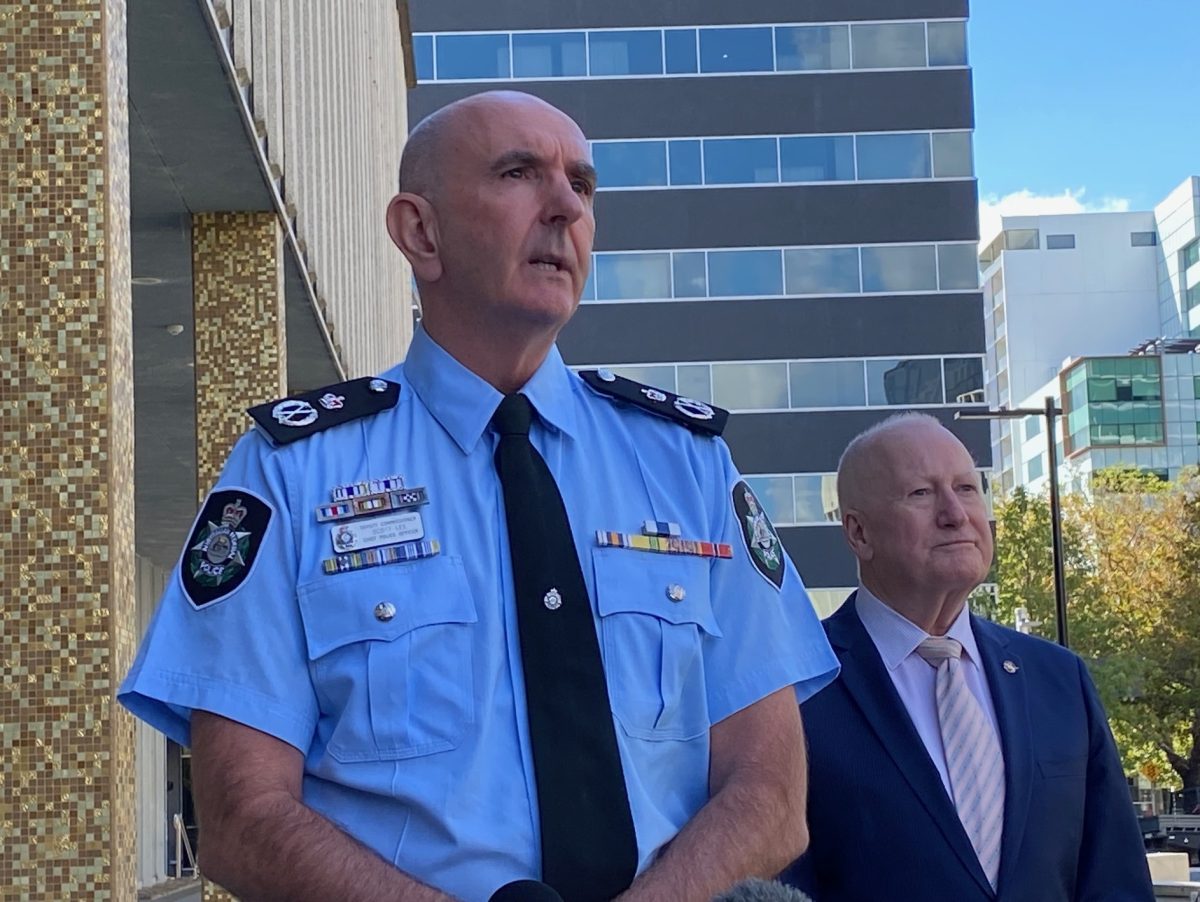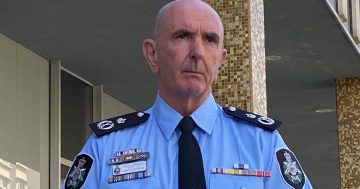
ACT Policing Chief Police Officer Scott Lee (pictured with Police Minister Mick Gentleman) is looking forward to working with the community and the government to keep Canberra safe. Photo: Claire Fenwicke.
Keeping Canberrans safe, protecting the health and well-being of officers, and getting facilities up to scratch are some of the key goals for ACT Policing’s 17th Chief Police Officer.
Deputy Commissioner Scott Lee has stepped into the role after Neil Gaughan announced his retirement following almost four years in the top job.
He’s come into a force that has 40 per cent of its policing infrastructure offline following the closure of City Police Station’s ground floor and the shuttering of the Gungahlin Joint Emergency Services Centre (JESC) due to contamination concerns.
CPO Lee said his primary consideration in this space was the health and well-being of officers who have been stationed at those locations.
“Our members are being pragmatic and flexible in terms of those interim arrangements we have in place,” he said.
“Certainly, they have a work location where they can start their duties, and we’ve put in some interim arrangements out in Gungahlin where they can undertake their administration and ensure they can stay in the region while they’re on shift.”
Gungahlin officers have been shifted to the former Traffic Operations Centre in Belconnen, while City officers have been stationed at the AFP’s headquarters in the Edmund Barton Building.
It’s still unclear how much longer repairs and remediation work at both closed sites will take. However, a recent report into the JESC contamination found only lead dust in the ceiling space and that no further action was needed regarding the diesel particulates detected.
The independently prepared risk assessment report didn’t identify any lead-containing dust on staff desks and other workspaces.
“During the survey, no obvious source of lead dust could be identified within the ceiling space or building throughout,” the report noted.
“It is suspected that potential sources of lead dust may originate from external atmospheric factors which have collected over time in the ceiling space which does not regularly get cleaned.
“Some possible external sources considering the age of the building may include the excavation and disturbance of soil adjacent highways/roads where leaded vehicles operate … it is also possible that lead-painted buildings that burnt down during the 2020 bushfires may have left a residue of lead dust due to smoke contamination throughout Canberra.”
Diesel particulate matter (DPM) had initially been found in the engine bay of the building. Testing found no presence of “elemental carbon” on any sampled surfaces.
“[This suggests] there was no presence of DPM on the surfaces tested,” the report noted.
It’s suspected the diesel particulates came from emergency services vehicles.
A government factsheet stated it was confident the building’s exhaust fans and vehicles were in good condition and that regular industrial cleaning was effective.
“We are doing a full industrial clean of the whole building to ensure that all potential contaminants … are removed,” it stated.
“This investigation shows that staff and volunteers were not exposed to lead dust or diesel particulates.”
In the meantime, another focus for CPO Lee is ensuring there are enough officers in the pipeline to meet Canberra’s future population growth and continue to improve and innovate in the force.
Crimes against the person will continue to be a priority over property crime, although CPO Lee hoped this would improve as the new police services model was implemented.
“There are two key aspects to that: one is very much providing us with the basis for an intelligence-led prevention-based model, and those steps are being implemented at the moment, particularly around how we look at some of those drivers of crime in the ACT around recidivist offenders and recidivism,” he said.
“The second will be the additional police resources that are being provided to us by the government … both of those will make some real benefits to the ACT community in the medium term.”
The government previously announced $107 million to recruit 126 new policing personnel over the next five years.




















